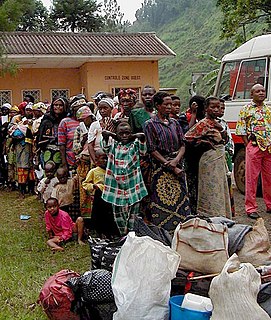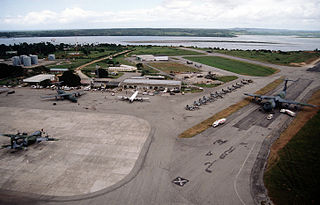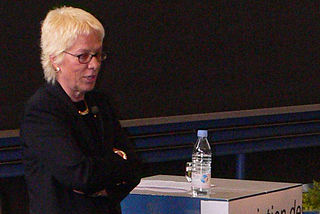
Rwanda has been the center of much international attention since the war and genocide of 1994. The country is an active member of the United Nations, having presided over the Security Council during part of 1995 and again in 2013-2014. The UN assistance mission in Rwanda, a UN Chapter 6 peace-keeping operation, involved personnel from more than a dozen countries. Most of the UN development and humanitarian agencies have had a large presence in Rwanda.

The International Criminal Tribunal for Rwanda was an international court established in November 1994 by the United Nations Security Council in Resolution 955 in order to judge people responsible for the Rwandan genocide and other serious violations of international law in Rwanda, or by Rwandan citizens in nearby states, between 1 January and 31 December 1994.

Paul Kagame is a Rwandan politician and former military leader. He is currently the President of Rwanda, having taken office in 2000 when his predecessor, Pasteur Bizimungu, resigned. Kagame previously commanded the rebel force that ended the 1994 Rwandan genocide. He was considered Rwanda's de facto leader when he served as Vice President and Minister of Defence from 1994 to 2000. He was re-elected in August 2017 with an official result of nearly 99% in an election criticized for numerous irregularities. He has been described as the "most impressive" and "among the most repressive" African leaders.
![United Nations Assistance Mission for Rwanda Failed UN Mission to mediate peace in Rwanda leading up to the [[Rwandan genocide]]](https://upload.wikimedia.org/wikipedia/commons/thumb/5/52/Emblem_of_the_United_Nations.svg/320px-Emblem_of_the_United_Nations.svg.png)
The United Nations Assistance Mission for Rwanda (UNAMIR) was established by United Nations Security Council Resolution 872 on 5 October 1993. It was intended to assist in the implementation of the Arusha Accords, signed on 4 August 1993, which was meant to end the Rwandan Civil War. The mission lasted from October 1993 to March 1996. Its activities were meant to aid the peace process between the Hutu-dominated Rwandese government and the Tutsi-dominated rebel Rwandan Patriotic Front (RPF). The UNAMIR has received much attention for its role in failing, due to the limitations of its rules of engagement, to prevent the Rwandan genocide and outbreak of fighting. Its mandate extended past the RPF overthrow of the government and into the Great Lakes refugee crisis. The mission is thus regarded as a major failure.

The Second Congo War began in the Democratic Republic of the Congo in August 1998, little more than a year after the First Congo War, and involved some of the same issues. The war officially ended in July 2003, when the Transitional Government of the Democratic Republic of the Congo took power. Although a peace agreement was signed in 2002, violence has continued in many regions of the country, especially in the east. Hostilities have continued since the ongoing Lord's Resistance Army insurgency, and the Kivu and Ituri conflicts.

Hotel Rwanda is a 2004 British–Italian–South African historical drama film directed by Terry George. It was adapted from a screenplay co-written by George and Keir Pearson, and stars Don Cheadle and Sophie Okonedo as hotelier Paul Rusesabagina and his wife Tatiana. Based on the Rwandan genocide, which occurred during the spring of 1994, the film documents Rusesabagina's acts to save the lives of his family and more than a thousand other refugees by providing them with shelter in the besieged Hôtel des Mille Collines. Hotel Rwanda explores genocide, political corruption, and the repercussions of violence.

The Rwanda national football team represents Rwanda in international football. It is controlled by the Rwandese Association Football Federation, the governing body of football in Rwanda, and competes as a member of the Confederation of African Football (CAF), as well as the Council for East and Central Africa Football Associations (CECAFA), a CAF sub-confederation that governs football in East and Central Africa. The team bears the nickname Amavubi, and primarily plays its home games at the Stade Amahoro in Kigali, the nation's capital. They have never qualified for a World Cup finals, and reached their first Africa Cup of Nations in 2004.

The African Union Mission in Sudan (AMIS) was an African Union (AU) peacekeeping force operating primarily in the country's western region of Darfur with the aim of performing peacekeeping operations related to the Darfur conflict. It was founded in 2004, with a force of 150 troops. By mid-2005, its numbers were increased to about 7,000. Under United Nations Security Council Resolution 1564, AMIS was to "closely and continuously liaise and coordinate ... at all levels" its work with the United Nations Mission in Sudan (UNMIS). AMIS was the only external military force in Sudan's Darfur region until UNAMID was established. It was not able to effectively contain the violence in Darfur. A more sizable, better equipped UN peacekeeping force was originally proposed for September 2006, but due to Sudanese government opposition, it was not implemented at that time. AMIS' mandate was extended repeatedly throughout 2006, while the situation in Darfur continued to escalate, until AMIS was replaced by UNAMID on December 31, 2007.

The African Union-United Nations Hybrid Operation in Darfur is a joint African Union (AU) and United Nations (UN) peacekeeping mission formally approved by United Nations Security Council Resolution 1769 on 31 July 2007, to bring stability to the war-torn Darfur region of Sudan while peace talks on a final settlement continue.

Human rights in Rwanda have been violated on a grand scale. The greatest violation is the Rwandan genocide of Tutsi in 1994. The post-genocide government is also responsible for grave violations of human rights.

United Nations Security Council resolution 872, adopted unanimously on 5 October 1993, after reaffirming resolutions 812 (1993) and 846 (1993) on the situation in Rwanda and Resolution 868 (1993) on the security of United Nations operations, the Council stressed the need for an international force in the country and therefore established the United Nations Assistance Mission for Rwanda (UNAMIR).

United Nations Security Council resolution 997, adopted unanimously on 9 June 1995, after reaffirming all resolutions on the situation in Rwanda, particularly resolutions 872 (1993), 912 (1994), 918 (1994), 925 (1994), 955 (1994) and 965 (1994), the Council extended the mandate of the United Nations Assistance Mission for Rwanda (UNAMIR) until 8 December 1995 and adjusted its operations from peacekeeping to confidence-building.

United Nations Security Council resolution 1503, adopted unanimously on 28 August 2003, after recalling resolutions 827 (1993), 955 (1994), 978 (1995), 1165 (1998), 1166 (1998), 1329 (2000), 1411 (2002), 1431 (2002) and 1481 (2003), the Council decided to split the prosecutorial duties of the International Criminal Tribunal for the former Yugoslavia (ICTY) and the International Criminal Tribunal for Rwanda (ICTR) which had previously been under the responsibility of one official, Carla Del Ponte, since 1999.

United Nations Security Council resolution 1534, adopted unanimously on 26 March 2004, after recalling resolutions 827 (1993), 955 (1994), 978 (1995), 1165 (1998), 1166 (1998), 1329 (2000), 1411 (2002), 1431 (2002) and 1481 (2003), the Council called on the International Criminal Tribunal for the former Yugoslavia (ICTY) and the International Criminal Tribunal for Rwanda (ICTR) to complete all trial activities by the end of 2008.

United Nations Security Council Resolution 1705, adopted unanimously on August 29, 2006, after noting a letter from the President of the Security Council, the Council extended the term of Judge Solomy Balungi Bossa at the International Criminal Tribunal for Rwanda (ICTR).
United Nations Security Council Resolution 1749 was unanimously adopted on 28 March 2007.
United Nations Security Council Resolution 1823 was unanimously adopted on 10 July 2008.
The following is a timeline of the history of the city of Kigali, Rwanda.





![United Nations Assistance Mission for Rwanda Failed UN Mission to mediate peace in Rwanda leading up to the [[Rwandan genocide]]](https://upload.wikimedia.org/wikipedia/commons/thumb/5/52/Emblem_of_the_United_Nations.svg/320px-Emblem_of_the_United_Nations.svg.png)








